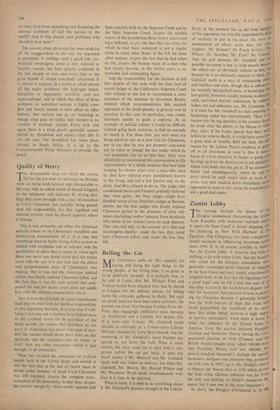Quality of Mercy
Tuc disreputable farce on which the curtain I fell for the last time in California on Monday went on being both farcical and disreputable to the end, with an added touch of Grand Guignol, in the telephone call (delayed by wrong dial- ' ling) that came through with a stay of execution as Caryl Chessman was actually being gassed. And the responsibility for this repellent and staining travesty must be placed squarely where it belongs.
This is not, primarily, on either the American ,judicial system or on Chessman's matchless and unwearying manipulation of it. It is true that something must be badly wrong with a system so riddled with loopholes and so infested with the possibilities of delay that a mouse of whose guilt there was never any doubt could play for twelve years with the cat; it is also true that the delays and postponements were of Chessman's own making. But it was not the American judicial system that finally ordered Chessman killed, and the fact that it was his own actions that post- poned his end for twelve years does not saddle him with the ultimate responsibility for it.
Nor is it to the principle of capital punishment • itself that we must look for the final responsibility in this degrading business. It is true that if Cali- fornia's law was not a century or so behind most of the civilised world (in its provision of the death penalty for crimes that elsewhere do not carry it--Chessman was never convicted of mur- der) the curtain would never have risen on this spectacle; but the execution was no worse, in itself, than any other execution—which is bad enough, in all conscience.
What has revolted the conscience of civilised people both in the United States and outside it was the fact that at the end of twelve years in prison under sentence of death Caryl Chessman was still executed, despite the complete trans- formation of his personality in that time, despite the narrow margin by which earlier appeals had been rejected, both by the Supreme Court and by the State Supreme Court, despite the terrible nature of the punishment those twelve years must have inflicted, despite the fact that the crime for which he had been sentenced is not a capital crime in many other States of the US, let alone other nations; despite the fact that he had taken no life, despite the human waste of a man who had clearly become, in the twelve years, a re- markable and outstanding figure. And the responsibility for the decision to kill him despite all this rests with the four (out of seven) judges of the Californian Supreme Court who refused at the last to recommend a com- mutation of the sentence to Governor Brown, without which recommendation this staunch opponent of the death penalty in general, and its exaction in, this case in particular, was consti- tutionally unable to grant a reprieve. As an example of judicial infamy it would be difficult, without going back centuries, to find an example to match it. For these four just men were not being asked to rule on a new trial for Chessman, nor to say that he was not properly convicted, nor to reject or change the law under which he was sentenced, nor to set him free. They were asked only to recommend the commutation to life imprisonment of a death sentence that had been hanging for twelve years over a man who must by then have suffered every punishment known to the living, and not a few known only to the dead. And they refused to do so. The judge who condemned Sacco and Vanzetti probably believed they were guilty; the Nazi judges might have pleaded raison d'etat; Dreyfus's judges at Rennes, duress; but the four judges who finally ordered Chessman gassed in the presence of sixty wit- nesses (including twelve 'selected fiom hundreds who wrote in for tickets') have no such defence. They are clad only in the armour of 'a thin and meaningless legality: under the law, they could have Chessman killed, and, under the law, they






































 Previous page
Previous page